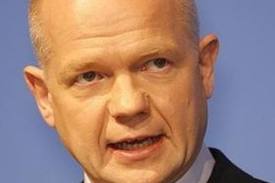 William Hague reiterated Britain’s support for Syrian rebel groups as fresh doubts emerged about whether it was possible to identify a moderate rebel grouping in the event of the fall of Bashar al-Assad.
William Hague reiterated Britain’s support for Syrian rebel groups as fresh doubts emerged about whether it was possible to identify a moderate rebel grouping in the event of the fall of Bashar al-Assad.
“The people of Syria should be in no doubt that the UK stands fully behind the Syrian National opposition – the sole legitimate representatives of the Syrian people,” Mr Hague said following a meeting with Ahmad Al-Jarba, the president of the Syrian National Coalition.
However the difficulty of backing rebel groups was highlighted by the emergence of a highly disturbing video showing one small rebel band carrying out the summary execution of seven Syrian soldiers in the province of Idlib last April.
The video, which was obtained by the New York Times from the disaffected aide of the rebel commander who ordered the killings, has highlighted the debate in the US over whether it is really possible to identify a ‘good’ faction in the fragmented rebel movement in Syria.
Although there are up 1,000 rebel groups, the White House and supporters of US action in Syria have argued that there is a moderate core that could be used to create a political settlement in Syria after the fall of the Assad regime.
John Kerry, the US secretary of state, has said that only “15 to 20 per cent” of rebels could be described as “bad guys”, while John McCain, the pro-intervention Republican senator who visited Syria earlier this year to meet rebel groups, has also been promising that there is a moderate core of rebels.
Mr Hague described the SNC as “the best possible hope for a political solution to the crisis and for a future Syria which is stable and democratic”, however the video has illustrated complexity of the situation on the ground, where rebel groups are not clearly divided on secular and jihadist lines, with many committing extortion, kidnapping and executions.
The New York Times reported that the rebels in the pictures – which were picked up by US television networks yesterday – may also have received weapons from the Western-supported Supreme Military Council of the Free Syrian Army.
The rebel commander in the video, Abdul Samad Issa, 37, who is also known as “The Uncle”, was reportedly motivated to carry out the executions after capturing the Syrian soldiers and discovering videos of the rape of Syrian civilians on their mobile phones.
He was also partly motivated by the fact that his father was killed in the 1982 crackdown against Muslim Brotherhood rebels by Hafez al-Assad, the father of Syria’s current president, further illustrating the tensions arising out Syria’s deeply troubled recent history.
A western diplomatic source, speaking to a select group of reporters last month, said that less than “30 per cent” of rebels fighting in Syria are palatable to Britain. He added that the rebels in that category were not in a coordinated group.
Having given this damming assessment of the armed opposition, he said a political solution remained the best option: “The alternatives to a political deal are all unattractive, Saddam ’91 scenario; Somalisation; or splitting up the country”.
The Telegraph

Leave a Reply
You must be logged in to post a comment.